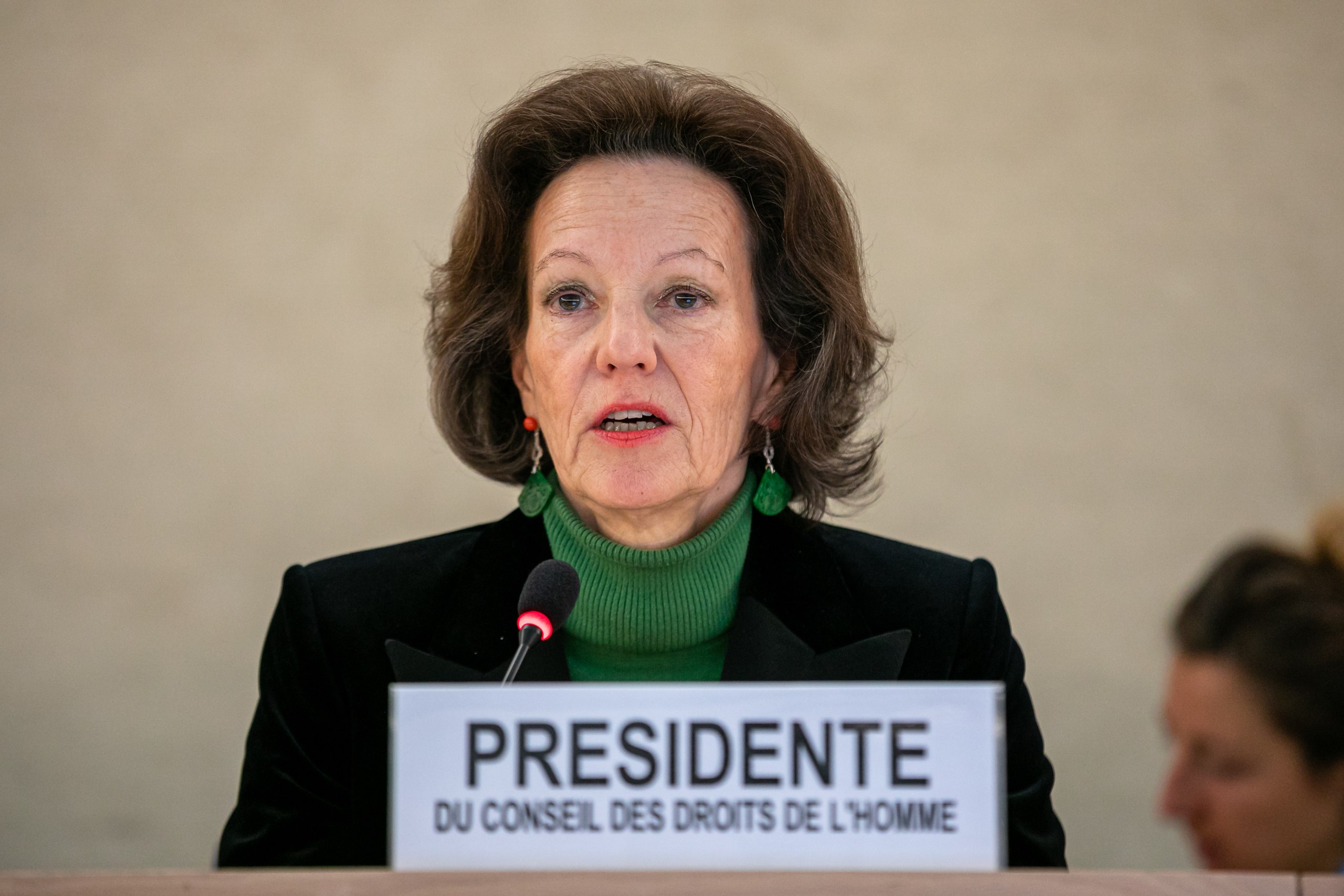« In negotiations women don’t focus so much on wining or losing, but in achieving compromises »
Interview with Ambassador Elisabeth Tichy-Fisslberger, Austrian Permanent Representative to the United Nations and the Conference on Disarmament in Geneva and President of the Human Rights Council for 2020.
Following is a transcript of an interview with Ambassador Elisabeth Tichy-Fisslberger, the Austrian Permanent Representative to the United Nations in Geneva. The interview was conducted by Audrey Steinmyller, of the Swiss Diplomacy Student Association (SDSA), in the framework of our series devoted to Women in diplomacy.
Could you tell us about your profession and give us a little summary of your professional background?
I studied law and languages, French and Spanish actually. Then I started working for the European Commission in Brussels for a few years and only after that I joined the Austrian foreign service. Then, I found myself very quickly back in Brussels. That was the time when my country, Austria, negotiated its accession to the European Union. I stayed a total of seven years in the Belgian capital and I also participated in the first Austrian presidency of the European Union.
After that I got deployed back in Vienna and again I was working on European Affairs. Then a few years later I became the Director General for legal and consular affairs, a position that I held for almost 10 years, which is an unusually long time. During that time I was confronted with many matters which we also find here in the International Geneva, with topics like migration, refugees and human trafficking. About 3 years ago I came to Geneva and for the current year I was elected as the president of the Human Rights Council which of course is a great honor.
Congratulations! It seems like you have had a long career behind you and still a long one to go ahead. On which fields of work do you currently focus more?
Well this year I try to focus on everything that the Human Rights Council does, even though I am the still the Austrian permanent representative here in Geneva. But my deputy has taken over practically most subject matters. So, I don’t only focus on migration, refugees and human trafficking and corresponding human rights issues, but I really try to cover everything the Human Rights Council covers and that’s a very wide area of human rights issues.
I guess. And as Ambassador of Austria for the United Nations, what is your daily life like? What are your responsibilities, and also what impact on that has the COVID crisis had?
Well normal life in Geneva consists on attending many meetings. Of course, it is different this year because we have been in lockdown for more than three months, with practically no meetings. Instead, we had a lot of video conferences, which is a new kind of routine, while we had none of these before. Now we have everything via video conferences, and I think some of it will stay. But you cannot replace the whole multilateral diplomacy by video conferencing. So, we will see with what kind of mix we come up once we are out of the lockdown.
The days I have at the moment are probably not very typical, but I have returned to my office at least every other day, even during the lockdown. I had a lot of video conferences and I tried to prepare for the resumption of the work of the Human Rights Council, which means that we have a lot of bilateral contacts with many Ambassadors as well. In the meantime, we managed to adopt a so called “presidential statement” on the covid crisis and human rights.
That was quite an achievement in technical or procedural terms because the Human Rights Council normally doesn’t work virtually and we had to prepare it only by video conferences. What we managed to achieve wasn’t easy, it’s not a very long text, but it tries to attract the attention of the international community to the fact that the covid crisis came with a lot of old and new human rights issues.
« In negotiations women don’t focus so much on wining or losing. They don’t necessarily think that compromise is the opposite of success. They think that compromises are actually difficult and very good to achieve because then everybody has some kind of ownership, everybody has contributed, and everybody has the feeling that they got something out of it. »
There are many studies that demonstrate that when women participate in negotiations, or conflict resolution, the outcomes are more sustainable and successful. What are your thoughts on that? Do you think it’s true?
Yeah, I think so. I think these studies refer in particular to negotiations for example in post conflict situations. If you have women on board, that means that they are thinking of the daily life implications for themselves, their family, their children, and society as a whole. They are less focused, I think, on who won and who lost, on the frustrations one had because one lost certain things. I think it is a different approach and women don’t focus so much on wining or losing. They don’t necessarily think that compromise is the opposite of success. They think that compromises are actually difficult and very good to achieve because then everybody has some kind of ownership, everybody has contributed, and everybody has the feeling that they got something out of it. You have to focus on the whole of society to establish peace and to find lasting solution. If you focus too much on certain groups like the military or the political leaders, then you just don’t have an angle wide enough and that is probably why some of these solutions don’t last.
Do you think that today, women in diplomacy face discrimination? Whether it be negative or positive discrimination?
I think it is still very different to be a woman than to be a man in diplomacy. But I think it is different from country to country. We have different types of societies and traditions, religions of course play a role as well, so you cannot compare, for instance, a country like Canada to some of the Asian or African countries to name just an example.
And what about in your country, Austria?
In my country, I think that due to the fact that there have been two major destructions in the 20th century and in particular that society more or less started from scratch in 1945, it just had to include women. So in Austria it is easier than in some other countries. Of course, there are traditional mindsets, but it became natural in the 20th century that women were part of the working world. Although for some time it was also normal that women didn’t necessarily get the top jobs, but this comes with time. So, I don’t think that I had a particularly difficult career. But still, there was a minority of women who got into the top jobs. For example, in our ministry we had seven Director Generals and during a very long time of my 10 years there I was the only women.
Do you think there is a kind of glass ceiling in diplomacy?
Well calling it glass ceiling may be too much, but some kind of ceiling which is difficult to get through is certainly still there. If you look at the diplomatic landscape here in Geneva, you will see that out of the more than 180 accredited countries, there are currently around 40 women Ambassadors. And the picture is similar with other diplomatic positions in international organizations and so on. The current Secretary General of the United Nations tries to appoint women and he has done very well in the last few years. But if you look at the international organizations as a whole, you will still see that in the leading positions you find more men than women.
« The current Secretary General of the United Nations tries to appoint women and he has done very well in the last few years. But if you look at the international organizations as a whole, you will still see that in the leading positions you find more men than women. »
Do you think that being a woman affected your career path and if so, how? Could you give us some examples.
It certainly did, but as I said, I didn’t think it was too difficult. Maybe I was fortunate in that the male bosses whom I had in the early stages of my career all had daughters. I guess they were more understanding with young women than maybe others would have had. So I personally cannot complain, but of course I have seen women who were confronted with strange jokes, who were belittled in what they were trying to do. For young women it’s sometimes more difficult to assert themselves because you always have to explain that you are not the secretary and that you are not the one who is going to serve coffee and things like that, but all that becomes a little bit easier as you get older.
In your opinion, what can be done to further promote the actions of women in the diplomatic world?
I think this is a gradual process. There is no silver bullet which you can use today, and the problem will be solved tomorrow. There is a change which comes over the years and with generations. I don’t consider myself to be part of the first generation of women in diplomacy, not in my country at least. When I was a very young diplomat there were some very old ladies already who were Ambassadors. I was told that when they first had ladies in our ministries – they had three of them right after the war – the men didn’t know what to do with them and they all put them into one office, so that they could stay physically together and not disturb the rest of them. So that must have been much more difficult than the situation when I entered the ministry. I think we have to wait. It is important that young women have access to excellent education and to practical experience at an early stage. Things like mentoring are certainly important. But I think that if the development goes on like it is going at the moment, progress will come over the years.
« It is always easier for a mediocre man to make a career than for a mediocre woman. That I think will stay for quite a while. »
Right so that should pass through education?
Yes, and one of the problems in many services is the kind of “old boys’ networks”. That is always very difficult for women. There is a tendency by some to give the jobs to the men in case of doubt. It is always easier for a mediocre man to make a career than for a mediocre woman. That I think will stay for quite a while.

